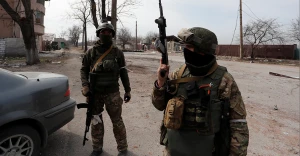
Ukrainian border guard shares her experience of Russian captivity
The border guard, who had been working near Mariupol since the beginning of the full-scale invasion, spent 6 months in Russian torture chambers. The woman told about her time in captivity
Espreso journalist talked to border guard Liudmyla Kravchuk.
Read the beginning of Liudmyla's story here: "We worked 15 to 20 hours a day": Volyn border guard Liudmyla Kravchuk speaks about rescuing soldiers in Mariupol
"We heard a command: we have thermal imagers, we can see you well. Surrender, or you will die," were the words Liudmyla Kravchuk heard when she and her group tried to get out of the besieged Mariupol. Then they were captured by Russian troops.
"It was a special unit of regular Russian forces. They even treated us very well," says Liudmyla Kravchuk. "We spent the night in a bus, they even gave us blankets. And they added that we were lucky because at least we were alive. But that was the end of their properness. We never received such treatment moving on."
Constantly bent over and sewing agricultural suits
Ironically, Liudmyla Kravchuk was brought back to the village of Sartana in the morning, but it was already under Russia’s control.
"We were taken to concrete hangars," she recalls, "There was nothing there, even windows had no glass. It was still extremely cold, it was raining and there were constant draughts. When I arrived, all the people from the hospital were already there. Those who had some sleeping bags laid them on the cold floor and spent the night there."
In the morning, everyone was taken to Olenivka. She spent several days there, and then was transferred to a detention center in Taganrog. Later she was taken to a women's colony in the Kursk region, Russia. According to Liudmyla, during interrogations, they collected information about cruel treatment of Russian prisoners of war or civilians. They asked what weapons were available in Ukraine. In addition, the Russian military constantly exerted moral and physical pressure on the prisoners.
"We were bent over, not even walking, but running," the woman says. "They were shouting: "Go even faster!" They forced us to sing the Russian anthem and recite Russian poetry. They told us that Ukraine no longer existed, that it had already been divided, that referendums had been held. They were constantly shouting at us. Some guards treated us more or less well, but some treated us very badly. I remember a girl got sick, a doctor came to her and started beating her, saying, "I came to work, and you are sick here and will infect me as well.”
In addition, women were forced to work.
"In Valuiky, there were convicts working. In the same room in the classroom, we sewed agricultural suits," notes Liudmyla. "Next to the room was a metal structure where garbage was burned. It was hot and all the soot was blowing through our windows. We were constantly sitting, unable to get up, stretch our legs and walk around. We had to sit and sew all the time. But it was easier in the sense that the day passed faster."
Her daughter did not recognize her, saying she did not know who was calling her
In captivity, Liudmyla was most afraid of the unknown. She admits that she kept telling the girls that they had to survive this period. They were also very worried about what country they would return to. The woman spent 6 months in such hell. And finally there was hope for release.
"We did not know until the last moment. We started to guess only in the Kursk region," says Liudmyla. "We were getting dressed, and one of the colony workers said, 'You are lightly dressed, then you will come to your Ukraine and say that the Russians have 'frozen you' here. It was such a wake-up call. And then they brought me back to Taganrog, but the attitude was completely different."
At that time, there were already some Azovstal nurses in the Taganrog colony. They took Lyudmila to her cell and gave her clean underwear. So the women had even more hope of returning.
"I remember that day well," says Liudmyla Kravchuk. "From Sunday to Monday at about five in the morning, before the 'get up' command, they started taking us out of our cells. But we did not believe it until the last moment. Even when we realized that we were going towards Ukraine. And when we arrived in the gray zone, we were so worried that we would not be able to make it."
And finally, the long-awaited moment came. The woman returned to Ukraine. The first thing she did was call her daughters back.
"I called my youngest and told her that I had already returned. And she replied, 'I don't have your phone number, I'm sorry, but I don't know who is calling me,'” she laughs.
The woman continued to undergo treatment and rehabilitation after her captivity. Last year, on December 22, she returned to service. "For personal courage and selflessness in the defense of state sovereignty and territorial integrity of Ukraine and loyalty to the military oath," she received the Order of Courage, III degree, from the President of Ukraine.
- News












































